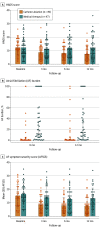Atrial Fibrillation Catheter Ablation vs Medical Therapy and Psychological Distress: A Randomized Clinical Trial
- PMID: 37698564
- PMCID: PMC10498333
- DOI: 10.1001/jama.2023.14685
Atrial Fibrillation Catheter Ablation vs Medical Therapy and Psychological Distress: A Randomized Clinical Trial
Abstract
Importance: The impact of atrial fibrillation (AF) catheter ablation on mental health outcomes is not well understood.
Objective: To determine whether AF catheter ablation is associated with greater improvements in markers of psychological distress compared with medical therapy alone.
Design, setting, and participants: The Randomized Evaluation of the Impact of Catheter Ablation on Psychological Distress in Atrial Fibrillation (REMEDIAL) study was a randomized trial of symptomatic participants conducted in 2 AF centers in Australia between June 2018 and March 2021.
Interventions: Participants were randomized to receive AF catheter ablation (n = 52) or medical therapy (n = 48).
Main outcomes and measures: The primary outcome was Hospital Anxiety and Depression Scale (HADS) score at 12 months. Secondary outcomes included follow-up assessments of prevalence of severe psychological distress (HADS score >15), anxiety HADS score, depression HADS score, and Beck Depression Inventory-II (BDI-II) score. Arrhythmia recurrence and AF burden data were also analyzed.
Results: A total of 100 participants were randomized (mean age, 59 [12] years; 31 [32%] women; 54% with paroxysmal AF). Successful pulmonary vein isolation was achieved in all participants in the ablation group. The combined HADS score was lower in the ablation group vs the medical group at 6 months (8.2 [5.4] vs 11.9 [7.2]; P = .006) and at 12 months (7.6 [5.3] vs 11.8 [8.6]; between-group difference, -4.17 [95% CI, -7.04 to -1.31]; P = .005). Similarly, the prevalence of severe psychological distress was lower in the ablation group vs the medical therapy group at 6 months (14.2% vs 34%; P = .02) and at 12 months (10.2% vs 31.9%; P = .01), as was the anxiety HADS score at 6 months (4.7 [3.2] vs 6.4 [3.9]; P = .02) and 12 months (4.5 [3.3] vs 6.6 [4.8]; P = .02); the depression HADS score at 3 months (3.7 [2.6] vs 5.2 [4.0]; P = .047), 6 months (3.4 [2.7] vs 5.5 [3.9]; P = .004), and 12 months (3.1 [2.6] vs 5.2 [3.9]; P = .004); and the BDI-II score at 6 months (7.2 [6.1] vs 11.5 [9.0]; P = .01) and 12 months (6.6 [7.2] vs 10.9 [8.2]; P = .01). The median (IQR) AF burden in the ablation group was lower than in the medical therapy group (0% [0%-3.22%] vs 15.5% [1.0%-45.9%]; P < .001).
Conclusion and relevance: In this trial of participants with symptomatic AF, improvement in psychological symptoms of anxiety and depression was observed with catheter ablation, but not medical therapy.
Trial registration: ANZCTR Identifier: ACTRN12618000062224.
Conflict of interest statement
Figures
Comment in
-
Benefits of Pulmonary Vein Isolation Beyond Rhythm Control: Implications for Mental Health.JAMA. 2023 Sep 12;330(10):919-920. doi: 10.1001/jama.2023.6484. JAMA. 2023. PMID: 37698577 No abstract available.
-
Atrial Fibrillation Catheter Ablation and Psychological Distress.JAMA. 2023 Dec 26;330(24):2397. doi: 10.1001/jama.2023.23120. JAMA. 2023. PMID: 38147097 No abstract available.
-
In symptomatic AF, catheter ablation vs. medical therapy reduced depression and anxiety symptoms at 12 mo.Ann Intern Med. 2024 Jan;177(1):JC4. doi: 10.7326/J23-0105. Epub 2024 Jan 2. Ann Intern Med. 2024. PMID: 38163378
References
Publication types
MeSH terms
Substances
LinkOut - more resources
Full Text Sources
Medical



